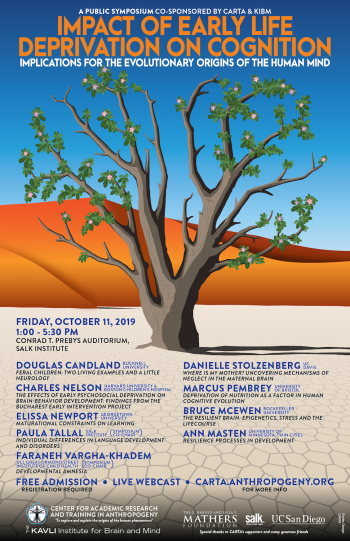Impact of Early Life Deprivation on Cognition: Implications for the Evolutionary Origins of the Human Mind
Paula Tallal, Salk Institute for Biological Studies
Faraneh Vargha-Khadem, UCL Great Ormond Street Institute of Child Health
Summary:
Unlike the case with most other animals, much of human brain development and maturation occur after birth, a process that continues into early adulthood. This unusual pattern allows for greater influences of environment and culture on the emergence of the adult mind. Ethical considerations disallow most experiments that might address the interactive contributions of nature and nurture in this process, which likely played a key role in the origins of the human species and in the evolution of distinct features of our minds. For similar reasons the relative importance of various factors cannot be easily studied, nor teased part. This symposium will address the matter to the extent possible based on available evidence, ranging from experiments by ancient monarchs and lessons from “feral” children of various kinds, to the follow-up of Romanian orphans, etc. while addressing comparative and neurobiological issues. Notably this symposium is co-sponsored by the Kavli Institute for Brain and Mind (KIBM), which organized a 2016 symposium on the Influence of Early Experience on Adult Brain Organization and Function, a logical prelude to this one.
Media for each talk can be played by clicking on icons in the table below, or by clicking on the individual talk titles below and then the attachment file at the bottom of the page.
| Speakers | Media | Session |
|---|---|---|
 Ajit Varki |
|
Prologue: Royal Experiments on Language Origins |
 Ajit Varki  Faraneh Vargha-Khadem |
|
Welcome & Opening Remarks |
 Douglas Candland |
|
Feral Children: Two Living Examples and a Little Neurology The question of what is learned, which is innate, and how the two relate is at the heart of 2,000 years and more of the 4,000 reports of feral children. I set aside, only briefly, any operational definition of 'feral'. The issue of innate or cultural is also at the metaphorical heart of this symposium. I offer my knowledge of two such living persons known to me, only one of whom has been documented in the TV literature. The first is John Ssabyuna of Uganda and the second, known as CauCau, of... read more |
 Charles Nelson |
|
The Effects of Early Psychosocial Deprivation on Brain-Behavioral Development: Findings from the Bucharest Early Intervention Project Experience is the engine that drives much of postnatal brain development. When children are deprived of key (i.e., experience-expected) experiences, particularly during critical periods of development, brain and behavioral development can be derailed. There is perhaps no more egregious form of deprivation than being raised in large, state-run institutions. In my talk, I will introduce a project launched nearly 20 years ago, based in Bucharest, Romania. In the Bucharest Early Intervention... read more |
 Elissa Newport |
|
Maturational Constraints on Learning It is well known that our ability to learn languages fully and fluently changes over age. While adults are skilled in many other learning tasks, only young children are remarkable in learning languages so well – often much better than adults. Of great interest, then, is how we have evolved to have such outstanding language learning abilities during childhood but which do not continue throughout life. I will discuss our findings on what the young brain computes that underlies our ability to... read more |
 Paula Tallal |
|
Individual Differences in Language Development and Disorders Language co-evolved with the human brain throughout the evolution of Homo sapiens. Most of what we know about language in the brain comes from studies of adults who already have a fully developed language system or who have lost language functions due to brain injury. However, if we want to understand the evolutionof language, our best insight may come from understanding the factors that affect the individual differences in language development and, more specifically, the various types of... read more |
 Faraneh Vargha-Khadem |
|
Developmental Amnesia In modern humans, an exquisite cognitive ability has evolved that enables ‘mental time travel’, viz: the ability to mentally travel back in time and re-experience a personal event from the past that is no longer physically present. This unique human ability, referred to as ‘episodic memory’, has a protracted trajectory, first emerging around the age of 3 or 4 when children begin to recalltheir past memories. The late emergence of episodic memory, in contrast to the very early appearance of... read more |
 Danielle Stolzenberg |
|
Where is My Mother? Uncovering Mechanisms of Neglect in the Maternal Brain In 2017 alone, an estimated 674,000 children were victims of abuse and neglect in the United States and over 1,000 of these children died from maltreatment. Mothers were the perpetrators in 69% of these cases and children under the age of one experienced the highest rates of victimization. However, in the same year less than 300 journal articles on the topic of infant abuse or neglect were published in the United States and less than 10 of these papers addressed potential causes of caregiver... read more |
 Marcus Pembrey |
|
Deprivation of Nutrition as a Factor in Human Cognitive Evolution Adequate vitamins and minerals are essential for normal cognitive development and iodine will be taken as the example. Severe iodine deficiency is a known cause of learning difficulties, but even suboptimal maternal iodine in early pregnancy can reduce the child’s verbal IQ. Early humans thrived on the coast, perhaps the rich iodine diet contributing to cognitive development. Interestingly, bonobos restricted to the central part of the Congo basin, regarded as iodine deficient, dive for... read more |
 Bruce McEwen |
|
The Resilient Brain: Epigenetics, Stress, and the Lifecourse The brain is the central organ of stress and adaptation to stress because it perceives and determines what is threatening, as well as the behavioral and physiological responses to the stressor. The healthy brain is resilient and responds to experiences over the lifecourse that produce epigenetic changes which result in structural and functional adaptive plasticity from the level of gene expression out to the cell surface. These changes are mediated in part by circulating hormones as well as... read more |
 Ann Masten |
|
Resilience Processes in Development Dr. Masten will discuss the meaning of resilience from a developmental perspective, highlighting the significance of findings from studies of extreme adversity in childhood for our understanding of processes that nurture or disrupt human capacity for adapting to challenges over the life course. She will discuss resilience as the capacity of a system (a child, family, community, economy, or other dynamic system) to adapt to challenges that threaten system function, survival, or development.... read more |
 Paula Tallal  All Speakers |
|
Wrap-up, Question and Answer Session, Closing Remarks |
| Attachment | Size |
|---|---|
| 173.84 KB | |
| 350.81 KB | |
| 554.92 KB | |
| 1023.38 KB | |
| 553.54 KB | |
| 125.88 KB |
If you enjoy this event, please consider supporting CARTA's quest to explore and explain the human phenomenon.


